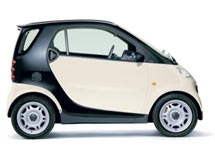|
Is Smart coming to the U.S.?
The loss-making city car from Mercedes-Benz may finally be headed to America.
NEW YORK (FORTUNE) - You can see tiny Smart cars, those egg-shaped two-seaters, doubled up in parking spaces or sitting on city sidewalks all over Europe, where they have been sold since 1998. But Smart has never come to the United States. The Mercedes-Benz unit has struggled to make money from the day it was conceived, and writeoffs to date run to the billions of dollars. With losses so steep, plans to sell the car here have been repeatedly delayed as Mercedes has struggled to find a profit-making formula.
Now, DaimlerChrysler chairman Dieter Zetsche is dropping hints that Smart will make its way to the United States. Speaking to reporters in Portland, Oregon last week at an event marking the 25th anniversary of Daimler's acquisition of Freightliner trucks, Zetsche said a final decision on Smart for the U.S. would be made this month, once a verdict was reached on how to distribute it. He added in his German-tinged English, "The tendency is positive in this regard." Translation: Consider it all but done. Whether selling Smart in the U.S. is, in a word, "smart," is another question. Even with gasoline selling for $3.25 a gallon, how much demand is there for a car that can only carry two people and which would seem to provide little crash protection for collisions from any direction? (The Smart ForTwo earned a rating of three out of a possible five stars in a European front crash test. Frontal crash tests only apply to collisions with vehicles of similar size, however.) For a time, Mercedes contemplated selling a Smart sedan or SUV but discontinued both models in an effort in an effort to stem losses. The ForTwo, the original two seat Smart, is being redesigned and will make its European debut in 2007. The version sold here will meet U.S. emission and crash standards. But it is hard to imagine that it will appeal to anyone living outside a major metro area. Its cramped interior and short wheel base don't lend it to long trips -- or even the 30-mile daily commutes that more Americans seem to be afflicted with. There is room for a little optimism. Two other new small car brands, Mini and Scion, have done spectacularly well here in the last couple of years. They are in short supply and sell strongly without the usual incentives. Each has used sharply different pricing strategies. Made by Toyota, Scion is budget-priced -- starting at $13,320 -- to appeal to younger buyers, while Mini Cooper, which is owned by BMW, is positioned as a premium small car, and sells for $18,000 and up. Smart prices will probably land someplace in the middle. Mercedes' lavish cost structure makes it unlikely that the car can be budget priced. At the same time, there will be an upward limit because Smart doesn't have the fun-to-drive or cute characteristics that Mini does either. It will likely sell on newness, stylishness (or lack thereof), and fuel savings. As one might expect, the little ForTwo also gets excellent fuel economy. Smart claims fuel economy ranging from 46.3 miles per gallon in the city to 70.6 mpg on the highway. Many industry executives are skeptical about Smart's prospects. "I think you can sell 20,000 or 25,000 a year at $12,000 apiece," says one veteran dealer. "But with exchange rates, and a platform, engine and transmission that aren't used by any other model, how is it possible for them to make money?" Another dealer says, "It is a great car for city commuting, but it is $4,000 more expensive than similar-sized cars you can buy in Europe that have a back seat. It will be very, very challenging." Which is one reason why Zetsche is still wrestling with distribution. Mercedes dealers aren't going to want to sell a car that makes no money and dilutes their image of exclusivity, so a new independent network will have to be created. "We want to work with a third party,'' Zetsche told a European business magazine recently. "We need a model that is very flexible and makes do with little investment." He sure does. Zetsche has vowed to make Smart profitable by next year and keep it in the black thereafter. Given Smart's history and the cost of a U.S. startup, that will be a tall order. Related: |
| |||||||||||||||||||||||||||||

